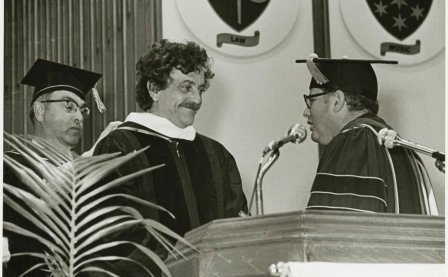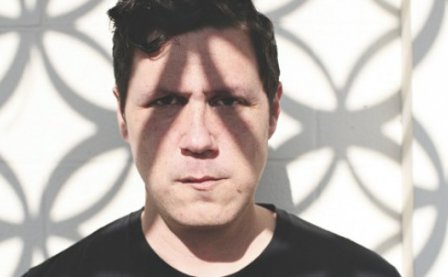Over the course of his career, Damien Jurado has explored the minutia of American life through a distinctive lens, with characters forced to confront the ugly truths and missed chances in dirt towns, soundtracked by Jurado’s plaintive, bare-bone folk sounds. His last record, 2008’s Caught in the Trees, turned the camera inward, dealing with the messy aftermath of the singer/songwriter’s divorce. It was a heavy album, fraught with aching drama, but also, for the first time in Jurado’s career, a necessary and hard-earned sense of hope. When Jurado sang, “He’s no bullshit talker,” in the record’s best song, one got the sense that he was bolstering himself up.
That no-bullshit line is important to keep in mind when listening to Saint Bartlett, Jurado’s new album, recorded in Cottage Groove, Oregon with label-mate Richard Swift at the helm. The album finds Jurado exploring the subtleties of hope, but not abandoning the willingness to dwell in dark places, where he made his name. The record opens with “Cloudy Shoes,” easily the most unguarded and bounding track Jurado has put to tape. His songs have always been tethered to the earth, with characters tied to their situations by cruel gravity; “Cloudy Shoes” breaks free from all of that, finding Jurado aimed celestially: “I wish that I could float up from the ground/ I will never know what that’s like,” he sings, but the swelling strings and lilting gospel piano give the impression of flight.
For someone who’s made his name in the shadows, such joyfulness is inherently risky, but Jurado tempers the song with tentative optimism, stating, “Magic will do/ What magic does,” and concluding, “I’m still trying to fix my mind.” “Arkansas” follows, addressing the themes of trees and magic again. “I want to believe you,” Jurado croons over Swift’s signature girl-group stomp, a rickety saloon piano plinking away over beer-bottle percussion. The two songs stand apart in their playfulness from nearly everything in Jurado’s catalog.
Swift’s production quirks clearly inspired the adventurous nature of the record. “Kalama” benefits greatly from the open drums and strident guitar work that bolster one of Jurado’s strongest vocal performances to date, as he belts out, “A house that is standing is no house at all.” “The Falling Snow” is similarly exploratory; again, the reverberating drums are a focal point, the nasty crack of the snare a wink at Swift’s own recordings. “Wellingford” serves as the record’s obligatory Crazy Horse moment, with fuzz guitar and ripping feedback underscoring the tugging menace of the song.
Even when the record returns to classic Jurado-style tunes — “Rachel & Calli,” “Pear,” and “Harborview” — the songs are augmented with odd clicks, ambient noise, and tape effects, clear nods not only to Swift’s production touches, but also to Jurado’s own off-kilter work, the elements that separate “Ghost of David” and the works that preceded it from “Where Shall You Lead Me” and the works that followed it: the creeping, ominous noises that define Jurado’s darkest work.
With its blend of classic Jurado themes and a new sonic palette, Saint Bartlett serves not just as an encapsulation of Jurado’s career, but as a promising indicator of where he’s headed. Closer “With Lightening In His Hands,” with its explicit references to his past work, showcases Jurado’s range, his uncanny knack for making plain words at once apocalyptic, beautiful, hopeful, tense, and forgiving. “Will you return/ With a mighty storm,” Jurado sings over a choir of his own muli-tracked voice, leaving little doubt that the character in question will indeed return, but managing to invoke the way nature works, balancing destruction with rebirth. Saint Bartlett finds Jurado doing the very same.
More about: Damien Jurado




